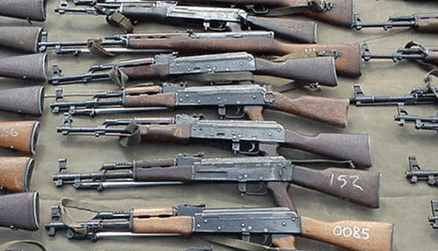ECOWAS arms transfer controls workshops opens
 The second Regional Workshop on Arms Transfer Controls and Arms Diversion opened in Accra on Wednesday.
The second Regional Workshop on Arms Transfer Controls and Arms Diversion opened in Accra on Wednesday.
The two-day workshop is being attended by representatives from the sub-region to discuss with international experts effective border controls, principles and best practices related to preventing and detecting diversion of arms in the sub-region.
The programme is supported by the German Federal Office for Economic Affairs and Export Control, Germany.
Mr Ambrose Dery, Minister of the Interior in a speech read on his behalf, said the diversion of arms occurred as a result of weak controls in arms transfers, re-transfers, thefts from poorly stockpiles, handouts to armed groups or barter involving natural resources.
The Minister said these diversions enabled rebels, gangs, criminal organisations and terrorist groups to have access to weapons and use them to terrorize the citizenry.
“Access to these diverted weapons breeds impunity and violence which negatively affects the positive image of Africans,” he added.
Mr Dery said statistics revealed that 52 per cent of global armed conflicts in 2014, occurred in Africa, although the continent had only 16 per cent of the world’s population.
He said the humanitarian and socio-economic consequences of arms diversion and the serious threats it posed to peace, safety, security, stability and sustainable development required a comprehensive strategy and approach to address the menace.
The Interior Minister noted that the proliferation of small arms accounted for a considerable number of needless deaths and injuries in the sub region, creating inter-communal tensions that escalates into conflicts.
He said in 2006, the West Africa Action Network on Small Arms (WAANSA) estimated that eight million small arms and light arms were transited through the sub-region.
The same year the Heads of States of the Economic Community of West African States adopted the convention to regulate the production, circulation and civilian possession of these arms as a collective measure against the menace that drives much of the insecurity in West Africa.
He said the convention enjoins member states to effectively combat the diversion and illicit trafficking of arms through marking, tracing, systematic and appropriate record-keeping mechanisms.
He therefore urged participants to exchange views and share experiences to facilitate regional cooperation in dealing with arms diversion in ECOWAS sub-region and adopt measures to address factors that lead to violence.
The Reverend Dr Paul Frimpong Manso, the Board Chairman of the Ghana National Commission on Small Arms and Light Weapons, said a baseline study in 2005 conducted by Kofi Annan International Peacekeeping and Training Centre indicated that local gunsmith had the capacity to produce over 200,000 weapons annually.
He said the Ghana Police Service estimated that around 80 per cent of the weapons seized by the Police and the Ghanaian security forces at crime scenes were locally made, saying mitigating these phenomenon required a concerted approach by all and sundry in the region.
Ms Caroline Cliff, Chair of the Council Working Group on Conventional Arms Export, European Union, pledged their commitment to support countries especially Ghana to deal with arms diversion.
Source: GNA
